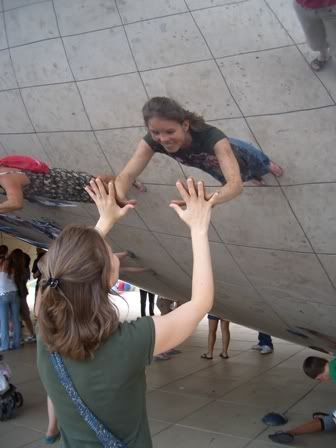Walking on Water by Madeleine L'Engle
The famous author of the beloved Wrinkle in Time series (also recommended reading – while these books may not be as overtly allegorical as the Narnia series, they represent L’Engle’s struggle to find the magnitude and mystery of God) talks frankly about art, the Christian life, and the intersection of the two. This book, subtitled Reflections on Faith and Art, is highly recommended for those in the church who feel that their creativity has been squandered or has not yet been discovered. It is recommended for artists who desire to meander through the mind of one of the contemporary celebrated.
L’Engle challenges traditional ideas of what it means to be a Christian artist. “Christian art? Art is art; painting is painting; music is music; a story is a story. If it’s bad art, it’s bad religion, no matter how pious the subject. If it’s good art – and there the questions start coming, questions which it would be simpler to evade” (p. 14). As Christians, we have at times relegated art to being mere pragmatic illustration, borderline propaganda. L’Engle reminds us that “to be a witness does not consist in engaging in propaganda, nor even in stirring people up, but in being a living mystery. It means to live in such a way that one’s life would not make sense if God did not exist” (p. 31, quoting Cardinal Suhard).
The author also challenges her fellow artists to obey God’s call: “The artist is a servant who is willing to be a birthgiver” (p. 18). While this is an intimidating call, “God is always calling on us to do the impossible” (p. 19). I found personal encouragement in her call to artists. My knowledge that I will never write, compose, or play as it ought to be written, composed, or played (and as a side note, I must freely admit that this is most likely tied closer to my pride than my desire to present God with an unblemished gift), paralyzes my small attempts. However, quoting author Jean Rhys, L’Engle records in her book, “All of writing is a huge lake. There are great rivers that feed the lake, like Tolstoy and Dostoyevsky. And there are mere trickles, like Jean Rhys. All that matters is feeding the lake. I don’t matter. The lake matters. You must keep feeding the lake” (p. 23). As to my pride and fears, L’Engle reminds me that “It is the pearl for which we have to pay a great price, the price of intense loneliness, the price of that vulnerability which often allows us to be hurt” (p. 165).
In regards to being a Christian, to living ethically, to following Christ’s footsteps, “It is a criterion of love. In moments of decision, we are to try to make what seems to be the most loving, the most creative decision. We are not to play safe, to draw back out of fear. Love may well lead us into danger. It may lead us to die for our friend. In a day when we are taught to look for easy solutions, it is not always easy to hold on to that most difficult one of all, love.”
Final thought: “There is nothing so secular that it cannot be sacred, and that is one of the deepest messages of the Incarnation” (p. 50). God made a lowly barn the birthplace of the divine King. God made the shameful and criminal cross His chosen method of atonement. God made me, disgraceful and fallen, His own child. If God can speak through the mouth of a donkey, through the poets in Athens, then He can speak through Mozart’s Requiem, through Gehry’s Guggenheim architecture, through Bach’s cantata based on the parable of the ten virgins, through Tolkien’s writings, through Sondheim’s Sweeney Todd. This is my Father’s world, and His marks are throughout His creation, from the singing blue jay to the cavernous Grand Canyon, to man and woman made in His image. “Provided he is an artist of integrity, he is a genuine servant of the glory which he does not recognize, and unknown to himself there is ‘something divine’ about his work” (p. 30).




No comments:
Post a Comment